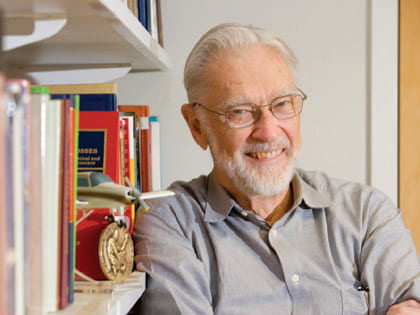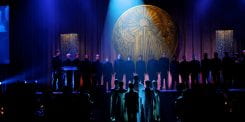Risky business
Predicting human behavior is no sure thing, but it earned Duncan Luce the National Medal of Science

The call came on Thursday before Valentine’s Day from President Bush’s science adviser Jack Marburger. R. Duncan Luce had won the National Medal of Science – the first University of California professor in the behavioral sciences and the third professor at UCI to receive the nation’s highest award in the sciences. Established by Congress in 1959, it honors “individuals for pioneering research that has led to a better understanding of the world around us.”
A month later, Luce was in the East Room of the White House accepting the award with a handshake from President George W. Bush. Around Luce’s neck hung the medal on a red, white and blue ribbon. The gold-colored disc, inscribed with his name and “National Medal of Science” clinked against his silver, Navajo-designed belt buckle.
Two different objects, yet they typify a man whose love of art and human nature has converged with his work over a half-century of describing mathematically how people make choices, and predicting what they’ll do when faced with risk or uncertainty.
CHOICE OBSERVATIONS
“I try to see regularities in the choices people make and capture them as behavioral axioms, then see what one can deduce from those axioms,” says Luce, Distinguished Research Professor Emeritus of Cognitive Sciences and Economics. In doing so, he brings scientific acumen to the vital real-world decisions required in such diverse areas as economics, consumer products and medical treatments.
Luce’s ideas are revealed in hundreds of articles and groundbreaking books that set the stage for other scientists. Not only does he develop revolutionary theories, he readily tests them with students and other collaborators. Generations of students and colleagues also have revered his texts on Individual Choice Behavior and Games and Decisions (with Howard Raiffa).
“Professor Luce’s fundamental contributions to mathematical psychology have guided the way the field examines decision making and sensory psychology,” says Chancellor Ralph J. Cicerone.
Reflecting on his own life decisions, Luce admits that some have been fraught with the same kind of risk and uncertainty he has spent his career studying. His undergraduate degree from the Massachusetts Institute of Technology is in aeronautical engineering. Enamored with theory, however, he switched to a doctorate in mathematics, eventually applying his combined talents to the behavioral sciences.
Pursuing a longtime love of flying, he took lessons in 1966. But that direction changed as well. When landing his four-passenger Beechcraft too closely behind a commercial jet at New York’s LaGuardia Airport, wake turbulence tossed his small aircraft around so violently the tower squawked, “Are you all right?” His reply: “No, I always land like this.” He chose to stop flying, yet still likes to show a visitor the white and gold replica of his Musketeer light plane sitting atop an office cabinet.
COLLABORATIVE CULTURE
After a stint on the UCI social sciences faculty from 1972 to 1975, Luce left to chair the psychology department at Harvard University. In 1988, then-social sciences Dean William Schonfeld arranged for his return to UCI, enticing him with the chance to create the Institute for Mathematical Behavioral Sciences, which he directed for 10 years.
“Returning to Irvine fit Duncan like a suit of his own clothes,” recalls his wife, Carolyn Scheer. “He was excited to start a research unit in his area of interest. Also, interdisciplinary collaboration is embedded in the campus culture, so we were able to embrace a broader range of friends and social life than at Harvard.”
In a gracious, unpretentious manner, Luce has been a model academic citizen. “He has served on committees, recruited new faculty and moved graduate education forward campuswide,” says School of Social Sciences Dean Barbara Dosher.
Indeed, as an artist studies the master’s strokes and engages them in new compositions, so Luce’s students have extended the essence of his work into their own wide-ranging research.
“Economists need quantitative models of behavior; Duncan’s work is at the intersection of economics and mathematical psychology,” says Elke Weber, Jerome A. Chazen Professor of Business and Psychology at Columbia University. Luce was her doctoral adviser at Harvard from 1980 to 1984.
“In his spirit, I study people’s perceptions of risk in areas like climate change and retirement savings, and also look at whether they take precautions due to their perception of crime, terrorism or not having enough money in retirement.”
Brian Wandell, Ph.D. ’77, worked with Luce 30 years ago as a UCI doctoral student exploring ways the nervous system captures information. Currently the Stein Professor in Psychology at Stanford University, Wandell is working on how children learn to read and interpret written information. “The real values Duncan imparted were of mutual respect, integrity and a thoughtful model of how to be a scientist. When I see my students walk in the door, I try to treat them the way Duncan treated me.”
For the black-tie dinner honoring Luce’s award, William Estes, research professor of psychology at Indiana University, traveled to Washington, D.C., to congratulate his friend and colleague of more than 50 years. Himself a 1997 recipient of the national medal in the same field, Estes says, “There are only a handful of people I seek out because they are such powerful minds that you get a lot out of seeing them for just a day or two. Duncan is one of them.”
And since that day or two in March, America can better appreciate Duncan Luce for what UCI and the nation have gained over the career of this incomparable scientist.
